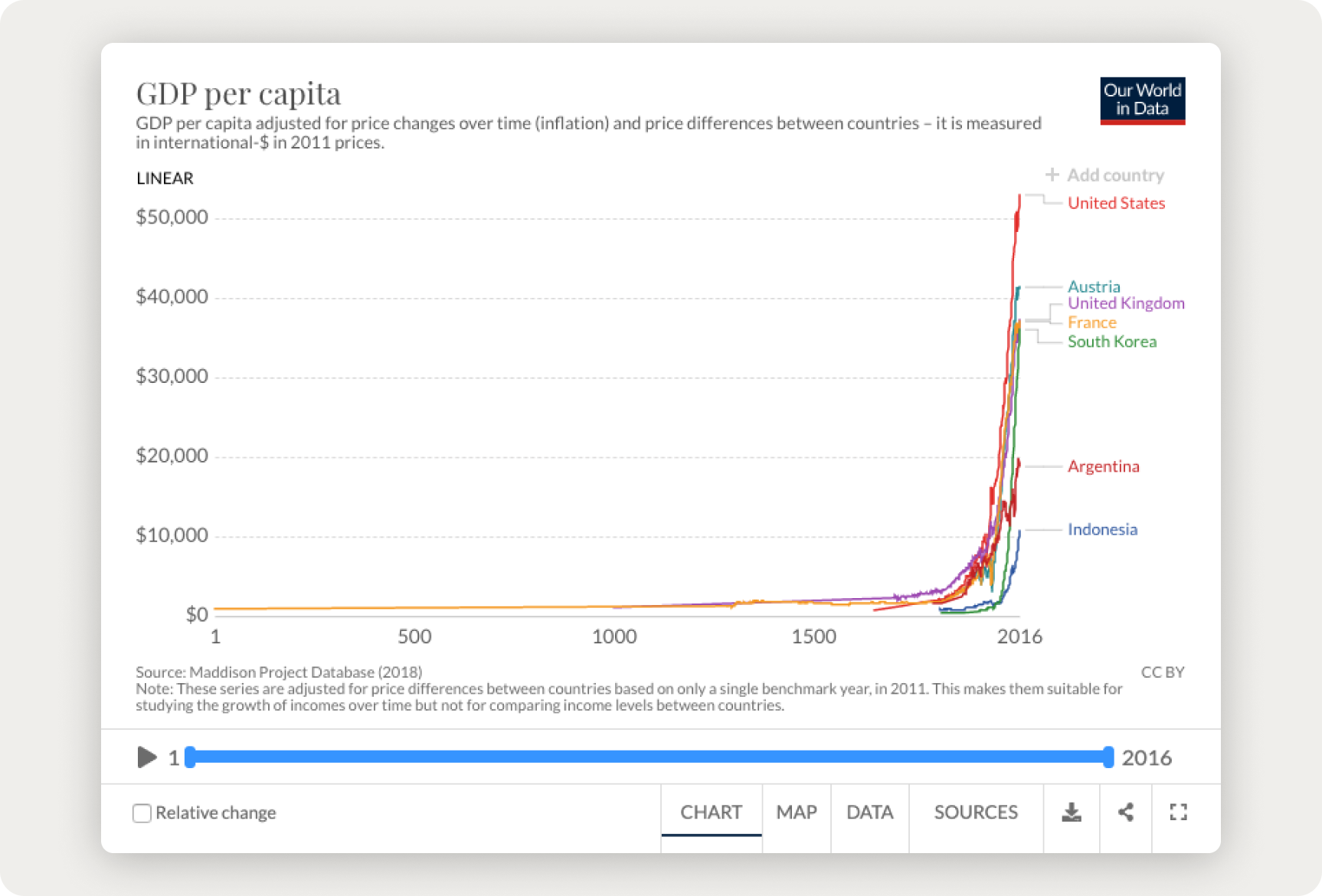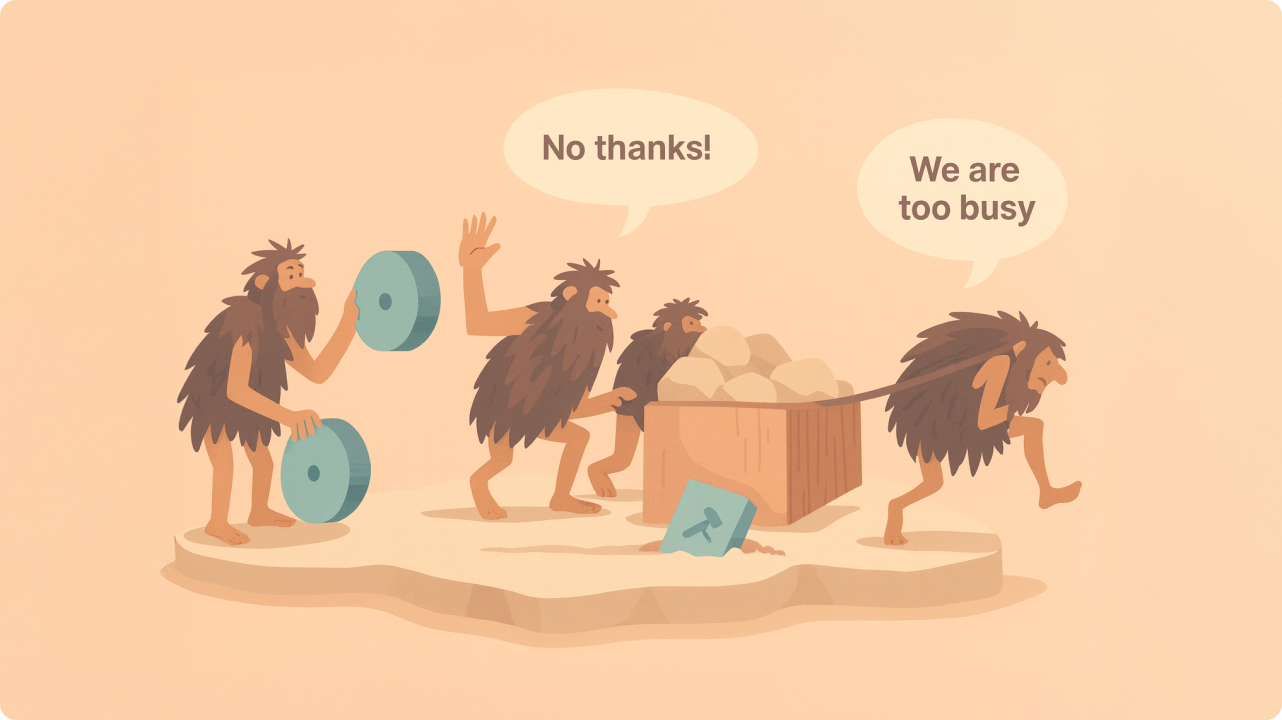
John Paterson
Founder & CEO, Quadshift
How are you spending your time?
In the year 1701, real GDP per capita in Great Britain (all in 2011 US prices) was $2,561 and 200 years later in 1900, it would grow to $7,446. A meager figure by today's standards, but still a massive growth trend would continue into the 21st century. Today (in 2013, rather) Great Britain's GDP per capita is $35,618.

https://ourworldindata.org/economic-growth#the-economy-before-economic-growth-the-malthusian-trap
For hundreds of thousands of years up to around the last several hundred years, life was a struggle for survival. However, from the industrial revolution to the modern era, there was a miraculous departure from what had historically been poverty, war, famine, disease and tyranny to sustained growth and progress. The ingenuity of our ancestors created the machines of the industrial revolution. Instead of human labor, we had the help of machines, and this changed everything.
- In 1712, Thomas Newcomen invented the first steam engine. It was used predominantly for coal mining to pump water out from the mines which would allow the miners to dig for coal further down.
- The "Spinning Jenny" was a spinning engine invented in 1764 by James Hargreaves. Able to be operated by unskilled workers, it was a key development in the industrialization of weaving, as it could spin many spindles at a time.
- The first recorded steam railway journey took place on February 21, 1812, when Richard Trevithick’s ‘Pen-y-Derren’ locomotive carried ten tons of iron, five wagons and seventy men 9.75 miles in four hours and five minutes.
https://www.historyhit.com/key-inventions-of-the-industrial-revolution/
While most people were struggling, there were a few people that were thinking about how to do whatever they were doing better by leveraging technology and machines. These inventions did not happen spontaneously. During the time that these inventors were working to make their ideas a reality, life was difficult. Despite this, inventors like Thomas Newcomen and James Hargreaves were spending their time differently than most.
James was illiterate and worked as a handloom weaver during most of his life, but he found the time and mental energy to create a rudimentary machine by today's standards (but a big improvement over existing techniques) that would contribute to the industrialization of cotton production. We can all learn from James Hargreaves.
James had to step out of the routine of his challenging work as a handloom weaver, to create a solution that would make his life easier, increase his productivity and output. Like James, we know we should be thinking about better ways to spend our time, even if it's not as impactful as creating the foundation for a new industry. Ways that will hopefully contribute to our higher productivity. It sounds simple, but often it's not so easy.
Most people prefer less cognitively effortful tasks when given a choice, a phenomenon known as ‘demand avoidance’. We don't want to exert ourselves if we don't have to, which makes sense evolutionarily. We prefer the easy path or the routine one. Energy is a precious resource, why spend it if we don't need to. Perhaps you can relate to the feeling of wanting to do the easy tasks on your to-do list first vs. the hard ones. Or worse yet, the day-to-day tasks vs. the meaningful tasks/projects that you haven't even thought of yet!
Ray Dalio, the largest and arguably most successful hedge fund manager of all time and author of the New York Times Best Selling book, Principles, suggests we must remind ourselves to step back, and evaluate ourselves and our "machines" from a higher level. It's necessary in order to orient your efforts and time in a way that will lead to better outcomes. Principle 1.10 (a,b,c) outlines this well:
"Think of yourself as a machine operating within a machine and know that you have the ability to alter your machines to produce better outcomes. By comparing your outcomes with your goals, you can determine how to modify your machine. Distinguish between you as the designer of your machine and you as a worker with your machine."
Viewing yourself as a part of a machine, evaluating its outcomes and creating the best machine possible, is going to be a good use of your time, if not the very best use of your time. Yes, it will be challenging, yes, you will want to avoid it, but the time you spend here will pay dividends.
To further stress the importance of reminding yourself to spend your time and energy wisely, we can get some advice from one of the most impactful leaders of our time. Jeff Bezos, Founder and CEO of Amazon, is noted for saying, "If I make, like, three good decisions a day, that’s enough. And they should be as high quality as I can make them."
We must focus our time and energy on what is important. You can only spend so much mental energy. Spend it like James Hargreaves, and maybe you'll create a machine like Amazon and be the next Jeff Bezos! Or maybe you'll research a new function in excel that will make a routine task take 50% less time. Both are good outcomes!
We all have those areas that are in need of closer attention and time, both small and large. Give yourself time to think and evaluate ways to make your life, work, tasks or routines better - it will always be time well spent.




